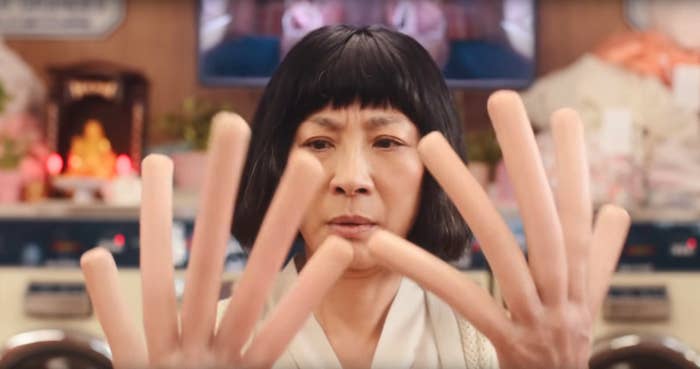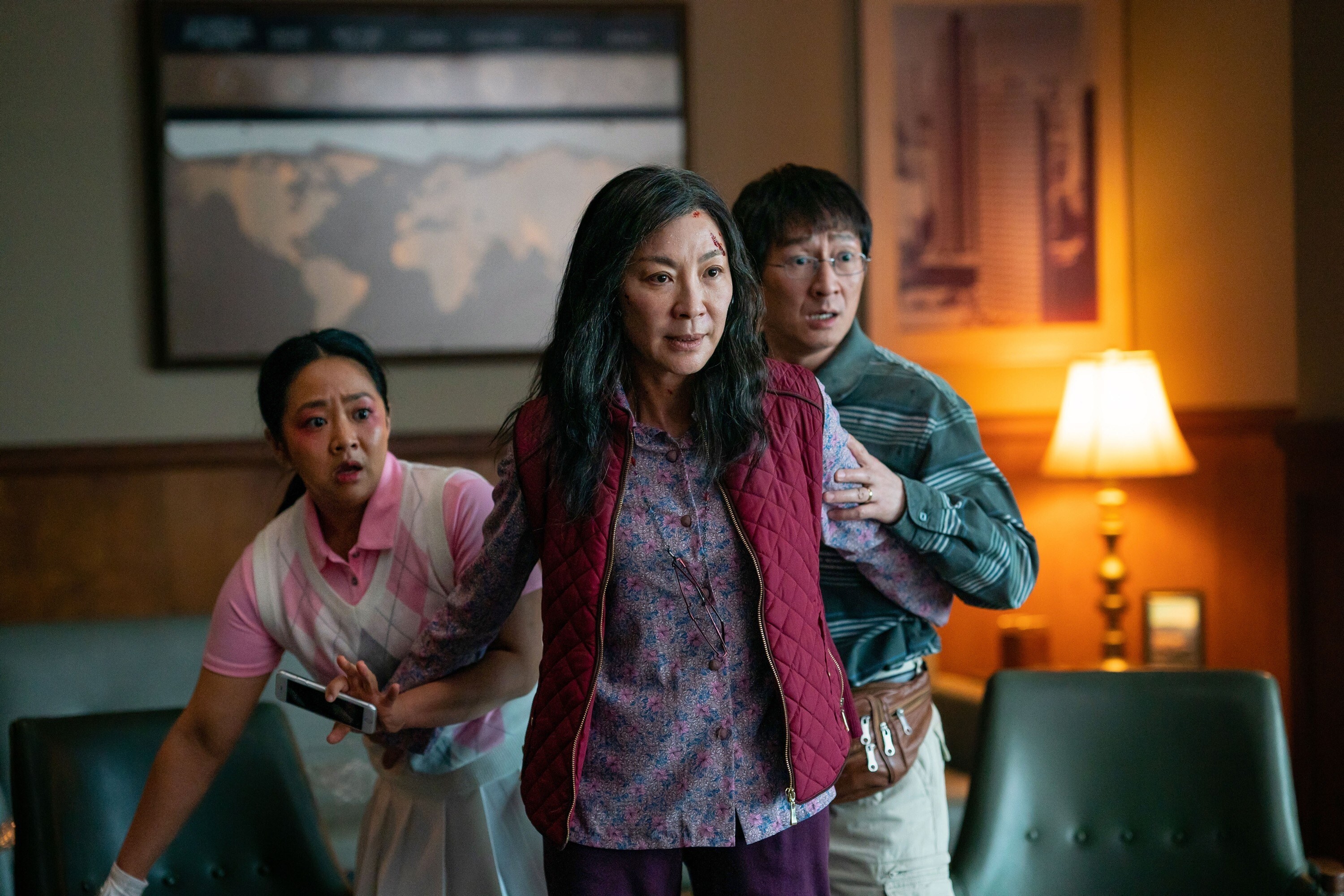On its surface, Everything Everywhere All at Once is about a woman just trying to do her taxes. When we first meet harried, unlikely, and unwilling hero Evelyn Wang (played by the inimitable Michelle Yeoh), she is literally buried under the weight of her responsibilities: Stacks of business receipts cover her dining table as she prepares for her meeting with the Internal Revenue Service. Her laundromat is being audited, and it doesn’t look good.
But by the end of the film’s first act, it looks even worse. Swaying as she addresses guests at her Lunar New Year celebration, Evelyn is facing what appears to be imminent ruin: An IRS agent and the police are en route to repossess her business; her naive, kind-to-a-fault husband Waymond (Ke Huy Quan) has filed for divorce; and her queer, Americanized daughter Joy (Stephanie Hsu) wants to introduce her girlfriend to her stern, unforgiving grandfather. When the IRS agent arrives, Evelyn coolly signs the divorce papers, grabs a baseball bat, and smashes one of the windows by the laundromat’s entrance.
Daniels — directorial team Daniel Kwan and Daniel Scheinert — began conceiving the story in 2016, when the US political climate began its freefall. Then, as they were writing, it just kept getting worse. Maybe that’s why they ended up creating a film that’s equal parts sci-fi, family drama, and kung fu comedy, a hectic mishmash of genres that both conveys and tries to make sense of upheaval.

The Wangs’ business write-offs tell a story of Evelyn trying on other potential lives: as an actor, a singer, a novelist, a chef, a teacher. “From a stack of receipts, I can trace the ups and downs of your life,” IRS agent Deirdre Beaubeirdra (played by Jamie Lee Curtis in a white blunt-cut wig and mustard turtleneck) says. “And it does not look good.”
But mid-interview, Evelyn’s world fractures, and she’s suddenly thrown into the multiverse. An alternate version of her husband, called Alpha Waymond, appears. He’s from the Alphaverse, an elite universe dedicated to restoring things to how they’re supposed to be, and he’s been searching for her because of all the possible Evelyns that exist, she’s the only one who can defeat the great evil spreading across all the universes. Of all the Evelyns across the infinite expanse of the multiverse, she’s the least successful one, but that’s precisely why she will succeed where all the other Evelyns failed: Her full potential is still open to her.
Evelyn learns to jump between universes, accessing the skills of her other selves. Across the multiverse, we meet Evelyn as a dominatrix, a hibachi chef, a queer woman with hot dogs for hands, a wuxia hero, a drawing, a piñata, a rock. At long last, Evelyn gets to be more than she is, but she’s not allowed to linger as any of her alternate selves. “If you fall for the temptation,” Alpha Waymond warns, “you invite contradiction. Chaos.”
The source of that chaos is the omniversal being Jobu Tupaki, who has no motives or desires. Jobu is Joy from the Alphaverse, pushed so far by the Alphaverse’s Evelyn that “her mind was fractured,” Alpha Waymond explains. “Her mind experiences every world, every possibility, at the same time,” and she is scouring the multiverse looking for the one Evelyn, leaving a trail of dead Evelyns in her wake.
The only way to defeat her, Evelyn realizes, is by becoming like her, going past her potential and breaking, which is how we find her back at her laundromat smashing the window.
In some ways, it’s shocking that Yeoh signed on to this dizzying and bizarre project. Perennially cast as dignified, intimidating, and unimpeachable characters — a famous geisha in 2005’s Memoirs of a Geisha, Aung San Suu Kyi in biopic The Lady, and the austere Eleanor Young in 2018’s Crazy Rich Asians — seeing Yeoh soil herself, projectile vomit, and have ketchup and mustard ooze out of her mouth was jarring. But Yeoh completely dismantles any preconceived notions of type; she’s vulnerable and expansive in this role as a mess of a woman who’s bad at everything.
Everything Everywhere All at Once flits between universes quickly, challenging audiences to keep up and make sense of every moment, as bewildered as Evelyn seems while moving through the multiverse for the first time. Stylistically, it’s ingenious; there is a calculated logic to this disjointed speed. Not everything in this ungodly tangle of images, sounds, and action makes sense on its own; much like a stereogram, the film appears superficially to be a haphazard collection of fragments and plotlines splintering in every conceivable direction, but once you stop focusing on the individual details and relax your gaze to appraise the whole, a clearer story emerges.
Curtis and Yeoh make a harmonious pair, sharing a subtle tenderness throughout, from the hot-dogs-for-hands universe in which they’re lovers to a thoroughly dull one where they’re the frumpy auditor and bedraggled auditee. “It’s cold unlovable bitches like us who make the world go round,” Deirdre says as she vapes with Evelyn outside the laundromat’s broken window. Their connection is all the more heartwarming because it is crucial in the fight against the great evil; in any shuffle of the multiverse, Evelyn is only able to turn the tide when she expresses genuine warmth toward Deirdre.

Hsu is mesmerizing as both the villain and the object of Evelyn’s affection and frustration. She is a temptingly nihilistic antihero, with her seductive ethos of “nothing matters.” Joy and Jobu guide the main tension of the film: what to do with all this chaos. The other characters don’t understand its purpose, so they fight to destroy it. But Joy plays in the murkiness of the unknown: She can’t articulate how she feels beyond the fact that she’s tired and hurting and she succumbs to her life’s private chaos. Jobu runs to the opposite end of the field, embracing the chaos with enthusiasm and reckless abandon. Hsu brings a dark humor to Jobu’s wryness and Joy’s defeated resignation, mimicking — if not parodying — millennials after a lifetime of surviving unprecedented events.
Waymond, Evelyn’s “silly husband,” who mischievously puts googly eyes on everything, also emerges as an unlikely hero. He’s almost saccharine in his lovable Asian dad-ness, doting on his adult daughter and gently refereeing Joy’s tense interactions with her mother. But his strength is in his kindness, which persists in his alternate selves, whether he’s an agent of the Alphaverse or the debonair leading man in a universe that recalls Wong Kar-wai’s romantic In the Mood for Love.
The stunt choreography pays a clear, delightful tribute to kung fu films. Brian and Andy Le, who were part of the stunt team behind Marvel’s Shang-Chi and the Legend of the Ten Rings, choreographed the film’s fight scenes, including one pearl-clutching scene in which Evelyn battles two minions from the Alphaverse (played by the Les themselves) and defeats them by simultaneously pulling phallic trophies out of both of their asses in midair. Even in such a comedically vulgar scene, Yeoh is masterfully focused, befitting a woman who might be too busy providing for her family to pay attention to them but will protect them by any means necessary.
As the characters cycle through different universes, they become more detached from who they really are, none more so than Evelyn. It’s damningly relatable in our social environment of tailored algorithms and proliferating platforms, but it’s also oddly gratifying to live vicariously through characters — many of whom are in their 50s or older — who feel trapped in the monotony of their own lives and abandon themselves to become absurd and depraved.
Here, the emptiness of “nothing matters” isn’t fatalist but freeing
Jobu is dangerous because, as Alpha Waymond says, she “has no sense of objective reality.” Maligned as a harbinger of chaos by her foes, she is actually a victim of chaos, broken by the multiverse’s sensory overload and straining to derive meaning from it. Finding none (at least, not on her own), she loses faith that anything is real, or matters.
Yet these emotionally estranged characters are all seeking the familial bonds that once held them together. Everything Everywhere All at Once plays with the tropes of strict Asian parents, intergenerational trauma, and conditional love as a gentle reminder to be compassionate with ourselves and each other. Across the multiverse, Evelyn meets people who are deeply lonely, and the only way to remedy their animosity is through sincere connection. It seems simple enough, but that’s a herculean undertaking with Jobu, who’s deeply alienated by her experience, or Deirdre, who believes she’s unlovable and has numbed herself to the world. These characters must confront who they are in order to find their footing again.
Evelyn’s desire to assume any of her parallel lives dogs her throughout the film. In these alternate universes, she doesn’t have a husband who’s trying to save their marriage or a daughter who never calls. In order for her to reach her potential, it appears she would have to leave them behind. But when the underbaked Evelyn fails, so do her other, more successful selves. Ultimately, it’s when Evelyn turns away from the profound temptation to escape her present circumstances, where she feels like the least capable version of herself, and be someone else that she sees her life and everything she has — however fleeting, unremarkable, and inconsequential — as something to cherish.
Everything Everywhere All at Once is deeply disorienting (though not, as some critics have claimed, because it’s multilingual), but the existential chaos is cathartic. Here, the emptiness of “nothing matters” isn’t fatalist but freeing because our expectations about how things should be no longer inhibit us from seeing how things actually are. Moving with the tides, rather than against them, makes us more resilient and capable.
As Evelyn tells Joy when they embrace after finally resolving to accept one another as they are, and appreciate the time they have together, “Nothing matters. We can do whatever we want.” ●
